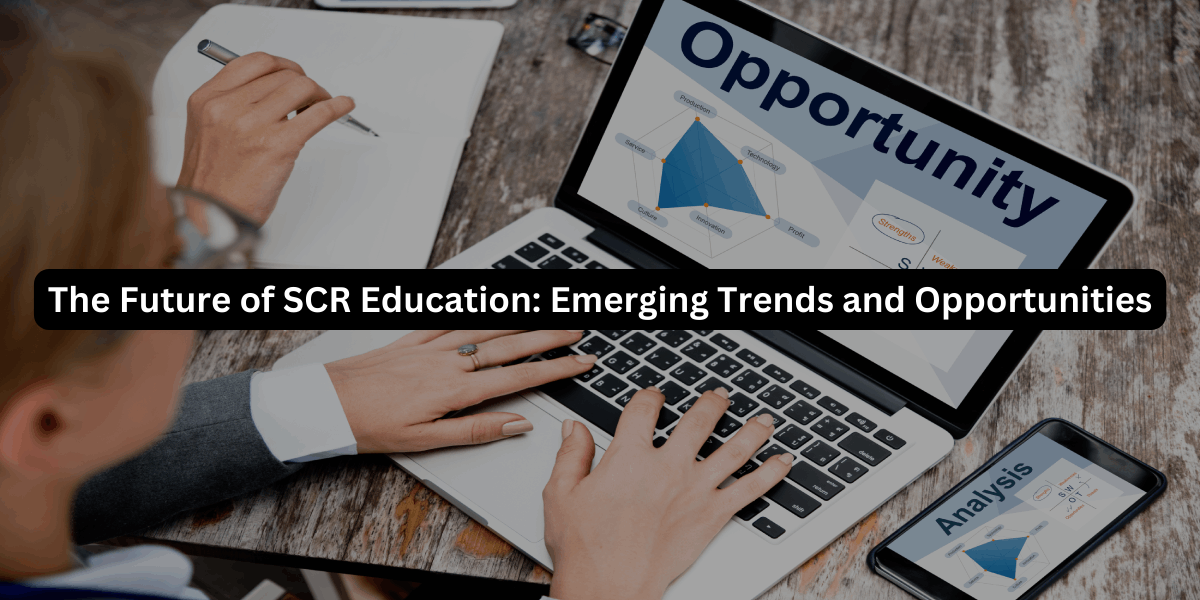
Blog
The Future of SCR Education: Emerging Trends and Opportunities

Introduction
Sustainability and Climate Risk (SCR) Education is no longer a niche field but an urgent global imperative. With climate change and environmental sustainability dominating headlines, there’s an increasing demand for professionals equipped with the knowledge and skills to address these complex challenges. In this blog, we will explore the emerging trends and opportunities in SCR education and their impact on future careers.
The Imperative of SCR Education
Sustainability and climate risk education, often referred to as GARP SCR (Global Association of Risk Professionals SCR), is crucial in today’s world. The dire consequences of climate change, from extreme weather events to biodiversity loss, make it imperative for individuals and institutions to understand, manage, and mitigate these risks.
Learn more – https://fintelligents.com/scr-exam/
Emerging Trends in SCR (Sustainability and Climate Risk) Education
- Interdisciplinary Approach: SCR education is moving towards a multidisciplinary approach. It integrates knowledge from environmental science, economics, finance, social sciences, and technology to provide a holistic understanding of sustainability and climate risk.
- Integration into Core Curriculum: Many educational institutions are integrating SCR education into their core curricula. This ensures that students from diverse backgrounds receive exposure to these critical concepts.
- Online and Blended Learning: The digital revolution has opened doors to online and blended learning methods. This accessibility allows a global audience to access SCR education through Massive Open Online Courses (MOOCs) and webinars.
- Experiential Learning: Hands-on learning experiences, such as real-world projects and internships, are becoming more prominent. These experiences allow students to apply their knowledge and develop practical skills.
- Customized Learning Paths: SCR education providers offer customized learning paths to cater to different audiences, from policymakers and business professionals to activists and educators.
- Climate Finance and Investing: Education related to climate finance and sustainable investing is gaining significance. Financial professionals are being trained to incorporate Environmental, Social, and Governance (ESG) criteria into investment decisions.
- Ethics and Social Responsibility: SCR education emphasizes ethics and social responsibility. It explores the moral dimensions of sustainability and climate risk, promoting responsible behaviour and decision-making.
- Data and Technology Integration: The integration of data analytics, artificial intelligence, and technology is essential in SCR education. Students learn to analyse data for climate risk assessment and sustainable solutions.
- Global Collaboration: Collaborations between educational institutions, governments, businesses, and non-profit organizations are crucial. These initiatives combine resources and expertise to address global challenges effectively.
All about SCR –
Possibilities for Development
The future of SCR education holds immense promise. It is evolving to meet the growing demand for sustainability expertise. Educational programs will continue to innovate and expand to include emerging topics and technologies.
Challenges in SCR Education
Despite the positive trends, there are challenges. Funding, access to quality education, and the pace of curriculum development can pose obstacles. It’s essential to address these challenges to ensure equitable access to SCR education.
Emerging Topics in SCR Education
As the field evolves, emerging topics like circular economy principles, sustainable supply chain management, and climate risk modelling will gain prominence. Students will have the opportunity to explore these cutting-edge subjects.
The Impact on Careers and Job Futures
The demand for SCR education translates into promising career prospects. Graduates with expertise in sustainability and climate risk will be sought after in various sectors, including finance, policy, renewable energy, and consulting. Additionally, sustainability certifications, such as the GARP SCR certification, will enhance job prospects and earning potential.
Conclusion
The future of Sustainability and Climate Risk Education is dynamic and essential for a sustainable future. The emerging trends and opportunities discussed here demonstrate that the field is evolving to meet the pressing challenges of our time. As SCR education continues to grow, it will empower individuals and institutions to make informed decisions, drive positive change, and build a more sustainable world for future generations. Whether you’re a student, a professional, or an advocate for sustainability, embracing SCR education is a meaningful step towards a greener, more resilient future.
